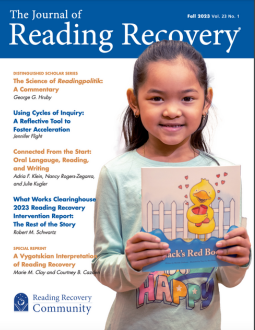THE JOURNAL OF READING RECOVERY
Fall 2023
The Science of Readingpolitik: A Commentary by George G. Hruby
Distinguished Scholar Series: A Vygotskian Interpretation of Reading Recovery by Marie M. Clay and Courtney B. Cazden
Using Cycles of Inquiry: A Reflective Tool to Foster Acceleration by Jennifer Flight
Connected From the Start: Oral Language, Reading, and Writing by Adria F. Klein, Nancy Rogers-Zegarra, Julie Kugler


